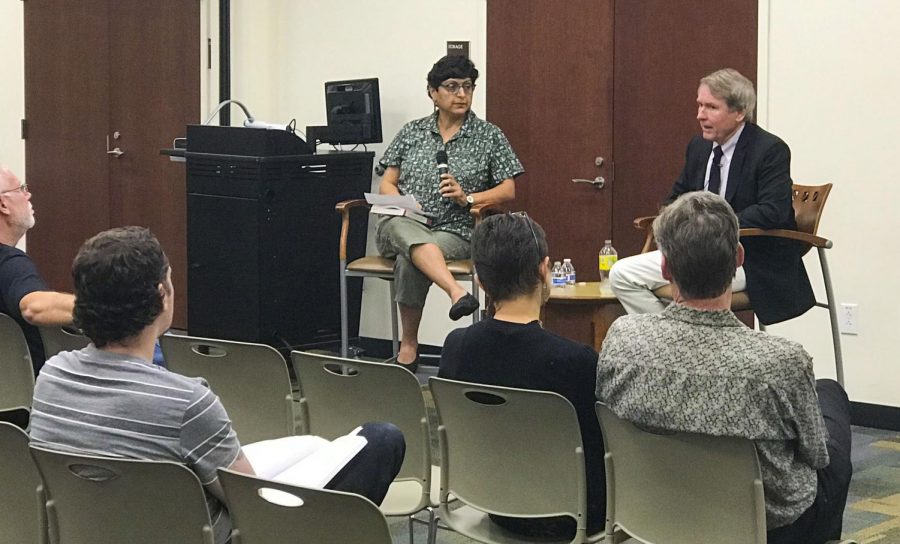Author Ben Fountain visits Cleveland
October 12, 2018
As a reporter covering the 2016 presidential election for The Guardian, author Ben Fountain found himself up close and personal with the the most confusing and controversial presidential race in recent memory. On Monday night his tour supporting his new book “Beautiful Country Burn Again: Democracy, Rebellion and Revolution” stopped at a public library in South Euclid, Ohio, where he was interviewed by Case Western Reserve University English Professor Thrity Umrigar.
Fountain includes himself in the ranks of those baffled by the 2016 race, and as a result spent much of the last two years working on the book, a nonfiction account attempting to explain what led to the particular conditions of the 2016 race and the current political landscape.
Fountain arrived at the library around half an hour before the event and sat down with members of Umrigar’s introduction to fiction writing class. (The reporter of this article is in this class).
Fountain engaged in an open discussion on topics ranging from the struggles of crafting characters to personal tactics for powering through writer’s block. When writing he takes a legal pad and sits in a room scribbling every thought, and described his drafting process as creative flailing.
Once the event started, Umrigar and Fountain launched into a 25-minute Q&A. They began with a few entertaining sneak peeks into his new book. The scenes of Ted Cruz addressing an Iowa crowd with what Fountain described as “preachily sanctimony” and campaign director Paul Manafort bringing “Freudian slips back into fashion” were crowd favorites.
Umrigar and Fountain touched on his previous work, a novel satirizing the coverage and treatment of the Iraq War and the soldiers that fought there. They ended with a serious discussion about the legacy of white supremacy and capitalism in modern American society. Fountain’s argument, which is laid out in the book, is that the United States has experienced two main reinventions, both advancing toward towards the egalitarian goals laid out in our Declaration of Independence.
The first, he explained, was the Civil War and emancipation, which were a critical expansion of the freedom principle that had to happen for the country to advance towards its goal of being a democracy. The second was Franklin Delano Roosevelt’s New Deal, which created a situation where hoards of workers were able to coexist.
Fountain credits all of the issues that the U.S. has reinvented itself to deal with and many that it struggles with today to a system that began with structural racism, with slavery being instituted to support the economic system. As a result, he explained to the audience that the entire system is riddled with structural white supremacy that divides the lower and middle classes and prevents people from fighting against their actual enemies.
After this powerful soliloquy the talk broke into audience questions, which were fairly straightforward questions about the book and dealing with Trump supporting family members. A relatively innocuous question about voter apathy led Fountain to describe that a large section of the population does not vote because they believe that neither party was actually making anything better. Playing to a largely left-leaning room, he then described the Democrats as the party that makes things worse slower, which led Umrigar, to call out audience member and journalist Connie Schultz, the wife of Democratic Sen. Sherrod Brown, for her thoughts on the matter.
Schultz took a moment to praise the book, saying it and the president had been constant points of discussion recently in the Brown-Schultz household. She then defended the Democrats as the only party working to solve student debt and raise the minimum wage. She asked Fountain what he thought the chances were that the Trump phenomenon would fade enough to allow the Democrats to retake the White House in 2020.
Fountain answered by comparing Trump to similar figures in American history like Sen. Joseph McCarthy in the 1950s. He warned that in the past, personalities like the president’s seem to have staying power for around five or six years. He also predicted that at some point the country would turn on Trump but not necessarily before the end of his first term.
The talk ended with applause and book signings.
“Beautiful Country Burn Again” is available online and in bookstores.



